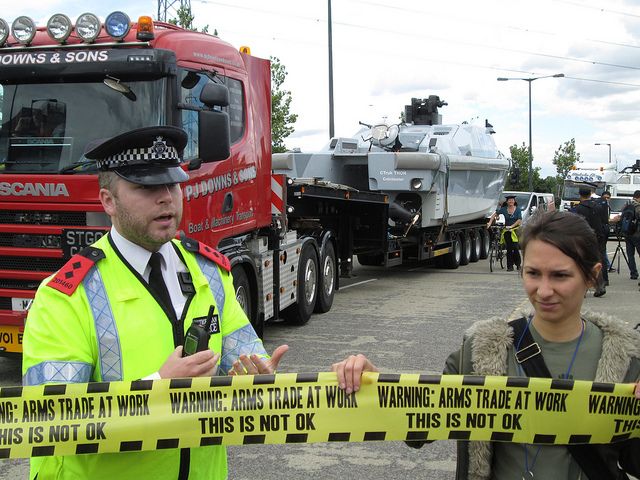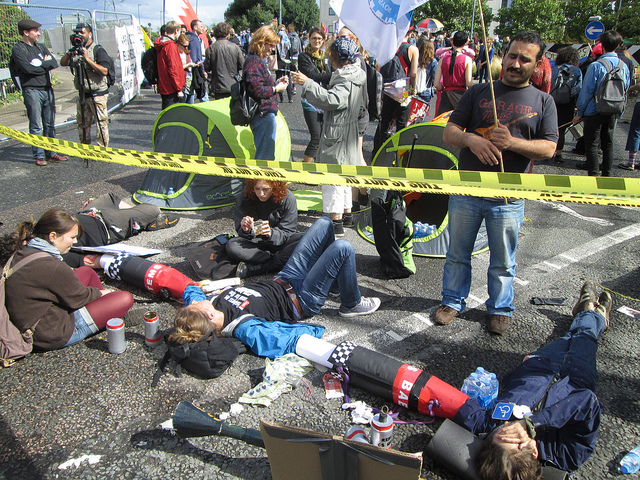DSEI 2013: Impeding the world’s biggest arms fair Special Report
New in Ceasefire, Special Reports - Posted on Wednesday, October 23, 2013 20:42 - 1 Comment

This year, the arms fair organisers faced new levels of disruption as the arms fair was challenged with daily direct action (Photo credits: flickr)
Last month, one of the most important events for the international arms trade did not make the headlines until its second day, when Caroline Lucas MP exposed how torture equipment – the promotion or sale of which is illegal in the UK – was being advertised at a huge arms fair in London. In fact, at least two of the 1500 arms companies displaying their wares at the biennial Defence & Security Equipment International (DSEi), which describes itself as ‘The World Leading Defence & Security Event’, were breaking the law.
The arms fair’s organisers immediately moved into action – ejecting the companies concerned, and assuring the media that this demonstrated their commitment to the event complying with international and UK law (despite illegal cluster munitions being advertised at the two previous fairs as well). The public were to be assured that the tanks, guns, missiles, and warships that remained on display were all perfectly legal.
True or not – it is impossible to scrutinise 1500 companies, particularly when access to the fair is restricted to those with established ‘defence’ sector credentials – this narrative stayed neatly within the framework adopted by the arms industry to constrain debate about its activities: using its legality to claim that it is justified.
It’s a framework that mainstream politicians repeat and solidify. Boris Johnson defended the arrival of 30,000 members of the arms industry to London as a “sensible” way to supply governments with “legal weapons” so they are “properly equipped”. The Defence Secretary, Philip Hammond, went above and beyond to praise a “fabulous show” displaying “fantastic kit”. It’s the same damaging framework that some campaigners consider to have been furthered by an international Arms Trade Treaty which does not restrict weapons sales, but does provide a hallmark of legitimacy of the vast majority of the world’s weapons transfers.
Johnson’s comments also characterise the doublespeak at work in politicians’ justifications for an industry that anybody not entirely alienated from their own humanity recognises as grotesque, profiteering from others’ misery and deaths. The “trade show” helps supply these “legal weapons” so governments can protect against those “who mean them and their people harm”.
There has perhaps never been a DSEi where the irony of this claim was more overt than the 2013 edition. In recent months we have seen unarmed protesters killed on the streets of Bahrain, Turkey, and Brazil. Not only were the companies which supplied the teargas used in this repression present at DSEi, but each of these countries’ militaries was invited bythe UK government’s arms sales unit: their trip to stock up on more weaponry for repression was facilitated using UK public funds.
Just one week after tens of thousands military troops were deployed in Bogota to suppress land rights protests, and days after another four protesters were killed, a military delegation from Colombia was welcomed.
In Bahrain, the right to protest was effectively suspended in August when the government promised to meet protests with force. Maryam Al-Khawaja, of the Bahrain Center for Human Rights explains that the Bahraini government “is committing rampant human rights violations on a daily basis… inviting Bahrain to the arms fair can only be construed as offering support for the crackdown and sending a message of business as usual.”
Needless to say, the risk of fuelling conflict with further weapons supplies has not seemingly discouraged the UK government from inviting military delegations from some of the world’s most militarised regions. Iraq and Afghanistan were invited. India and Pakistan were both here as guests of the UK government too.

(Photo credits: flickr)
The work to secure the attendance of the big buyers is just one way in which the arms fair is subsidised and supported by the UK government. Many others were apparent throughout the week.
The government’s arms sales unit, the UK Trade & Investment Defence & Security Organisation (UKTI DSO), co-organise the fair, providing logistical and political support. High-level civil servants from this department were spotted mingling with arms dealers at an opening night reception at the Cutty Sark. A more subtle subsidy is the presence of the British military at the fair. As the warships arrive in the docks by the ExCel Centre, you note that they are not owned by arms companies nor staffed by arms company personnel, but by the Royal Navy.
As soon as the fair begins, the G4S security guards at the gate are joined by soldiers. When twenty protesters spontaneously obstructed a truck bearing an armoured vehicle from entering the fair, the driver was joined within minutes by two soldiers who hopped into his cab. After you’ve been followed everywhere for 6 days by someone who’s always near the protests but never part of them, you begin to note the scale of public resources the policing bill consumes as well.
The arms fair doesn’t just put a spotlight on the UK’s role in arming the world, it exposes the extent of militarism here too. Not only are UK weapons exports subsidised to the tune of £700 million a year, but its military spending is the fourth highest in the world. Homelessness and hunger have escalated as a direct consequence of public sector cuts, yet military spending has been protected, to such an extent that Philip Hammond unveiled a £160 billion shopping list at the start of this year.
Militarism has been normalised. When Newsnight covered the arms fair, it failed to include a single critical voice. This is despite the fact the fair hosted the main military suppliers to Assad, just two weeks after the threat of UK military action in Syria had been averted. The arms fair organisers do however show some awareness of the fragility of the ‘legal therefore justified’ narrative. Press access to the event is heavily restricted. Those that make it in are assigned an accompanier from the fair’s PR team and steered away from military delegations. One journalist had his press pass revoked, simply for tweeting using the protesters’ hashtag ‘#stopdsei’.
This year, the arms fair organisers also had to deal with new levels of disruption as the arms fair was challenged with daily direct action. Within minutes of the launch, the biggest action, labelled ‘Occupy vs the Arms Fair’, had halted the entrance of two boats with gun turrets for display at the fair. Hundreds of people – some at their first ever protest – blocked the Eastern entrance to Excel for over four hours. Diversity of tactics took on a new meaning as priests refused to leave the road until their exorcism of the fair had been completed, while others locked on, died-in and performed songs and theatre in the road.
The Occupy vs. The Arms Fair action – on the eve of the new drones conference at DSEi – set the tone for the rest of a week, in which protesters blockaded two arms dealers’ dinners, blocked access at the main visitor entrance to the fair for over an hour on its opening morning, shut down Lockheed Martin’s offices, and misdirected arms dealers from London City Airport.
The Occupy movement maintained a camp on a roundabout at the Eastern entrance – apparently the only piece of public land to survive the privatisation that accompanied the Docklands’ ‘redevelopment’. The camp was emblematic of the connections that can be made between austerity, militarism and repression. It was visited by activists from Bahrain, including survivors of the brutal repression with which democracy protests have been met for the past two years.
Five hundred people, only thirty of whom were arrested, managed to block access for nearly a full working day during the week of the arms fair. The arms dealers plan to return on 15-19 September 2015. We plan to stop them. Imagine if 500 people became 5000. The arms fair would soon become unworkable, and our resistance to it a material challenge to the interests driving austerity, militarism and repression around the world.


well done, wish I could have been there! I plan to be there in 2015.
please keep me posted.
thanks from a Greenham veteran
love and peace